Video: Afsar Dayatar Nithya Ramani in Mumbai
When R Anandh graduated from Rourkee Engineering College in Uttarakhand, he realised he was more a musician than an engineer.
Nurturing his childhood passion for music, he made a name for himself in the world of advertising, his most popular jingle being for Limca. He then became a part of a band called Agosh, along with Gopal and Shaleen. After a Bollywood debut with Sangeeth Sivan's Zor (1998) and the Indipop album Paisa, Agosh dissolved and Anandh went back to advertisements.
Thanks to filmmaker Pradeep Sarkar, he returns to the movies with this week's release, Lafangey Parindey, starring Deepika Padukone and Neil Nitin Mukesh.
Anandh talks to Nithya Ramani about the film, struggling with the Hindi language and his association with Sarkar.
What took you so long to return to films after Zor?
Zor was by my band Aagosh. I don't think I had great experience in films until then, so I went back to my core competence -- ads. I still love doing ads more than films.
Something worthwhile came up after all these years, so I took it up. I have done a lot of ads for dada (Sarkar) and he asked me if I was interested in doing this film. I didn't know if I could, but I thought I should give it a try.
I am not a film person. Even after Lafangey Parindey, I am not hard selling for films. If something comes up, I'll do it. But a job is a job, be it ads or feature films. You just give your best.
'I was given complete freedom'
Image: A scene from Lafangey ParindeyTell us about the music of Lafangey Parindey.
Dada briefed me about the film, and told me that it was set in gritty Mumbai. I didn't think much about the genre, and did what came to my mind. There are too many genres in music and I find it confusing. I believe that if you listen to a song and like it, it is a good genre for you. If you don't like it, it is a bad genre for you.
The thing with dada is he lets you do what you want to do. He gives you the situation and leaves it up to you. Of course, it needed approval from (producer) Aditya Chopra.
Take us through the making of the songs.
I will talk about the title song. Pradeep kept calling me to work on ads and every time we would work on them, he would ask me when I would work on the film. If he kept calling me for ads, how could I work on the film?
One day, he called me for an ad and when I reached, there was some problem in the editing studio and we couldn't do it. I was happy thinking that I could go home. Dada suddenly asked me to work on the film's song. I was caught by surprise. I don't know how but I made a scratch and gave it. Surprisingly, Adi liked it and the ball started rolling.
'I wasn't much of an engineer'
Image: A scene from Lafangey ParindeyHow did your interest in music begin?
I learnt to play the Veena (Indian classical instrument) when I was very young. I learnt it for 10 to 12 years, so I was quite grounded on doing something in music.
In college, people thought I could play the guitar and motivated me. I started playing Carnatic music on the guitar and that led to other stuff. I ended up being the lead guitarist of the college band.
Since I had a keen ear for music, I was interested in the keyboards, base, drums... This was in Rourkee. At the end of four years, I think I wasn't much of an engineer and was sure that I would not get a job. Since I had to something, and music was my passion, I thought of sticking to music.
How did your parents react?
I came back to Chennai and told my dad. He's probably the best dad. He told me that there were things apart from engineering, medicine and academics, and if I was interested, I should try my hand at them. He said it was okay even if it took time. There was not one word of discouragement.
For two to three years, I didn't get much work, but after work started happening, it has been very good.
Was anyone in your family interested in music?
I don't think it is in our blood. Mom used to sing; dad loves music; my brother is into music too, but I wouldn't say it is in our blood. It is something I was exposed to when I was young and I took to it. I am quite happy now.
'I normally translate the lyrics and sometimes goof up'
Image: A scene from Lafangey ParindeyWhat happened to Aagosh?
We are still good friends. Shaleen moved to Mumbai and became a music maker. I happened to come here for a day's work and ended up staying here. It's been five years in Mumbai now. Gopal is still in Chennai, continuing with music and singing. He doesn't want to come to Mumbai yet but I don't know how long he will be able to resist the temptation [laughs].
After our first album Paisa, we went our separate ways. I don't know why. At that point, there wasn't too much to do in non-film music; there wasn't much revenue coming our way either. But we had fun doing Paisa.
When did you decide to move to Mumbai?
My dad was no more by then. I never thought I would shift to Mumbai. I had settled down in Chennai, with a studio, a house and a good list of clients. One of my clients had shifted to Mumbai and he would call me to records tracks for him. I would come only for a day. But once when I was in Mumbai, I got a call from someone else and agreed to do their work too. By the end of that day, I was booked for 10 days.
I was hesitant to stay in a hotel for so long. My wife knew someone, who wanted to rent out a fully-furnished flat. So I went there. I called up my wife the next morning and asked if she wanted to come here and just hang around.
The next day she and our son came and stayed for a couple of days. That's when we thought about moving here. One week later, all our stuff from Chennai was brought here. It wouldn't have happened if I had planned it because I am very lethargic, and the very thought of shifting would have been a hassle.
How did you handle the language barrier?
I was exposed to Hindi in Rourkee. I could manage, I can even now though if you ask me to speak in hard core Hindi, I won't be able to do it. I get confused with the gender for words. Down south, we don't have gender for words.
I can read the Devnagri script, but not fluently. I normally translate the lyrics and sometimes goof up. When we were working on the title song of Lafangey Parindey, in the line 'Udte firte azaad mast, har mushkil ko karte hai past', udte was written as udate and I fit my tune to that. On the day of the recording, Swanand (Kirkare, lyricist) pointed out the mistake and I was in a fix. It was very difficult to change because I got so used to the tune with udate. We finally fit it in, but such things happen to me on a daily basis.
But it has also turned out to be advantageous because when I get Hindi lyrics, I tend to split a word into two and give it a new tune, which any other person wouldn't normally do.
'Pradeep Sarkar and I are complete opposites'
Image: A scene from Lafangey ParindeyHow was the experience of working with Kirkare?
He is an awesome person, an awesome lyricist. I have worked with him on my Limca ads too. I am someone who wants the lyrics first while the widely accepted format is vice versa. Swanandji was nice enough to accommodate that.
How did you meet Sarkar?
I have worked with him on ads for a long time. I knew that Lafangey Prindey talks were on, but never did I think that he would ask me to do it. We gelled very well, which is very surprising, knowing the kind of person he is and the kind of person I am; we are complete opposites. I believe that under that huge frame and commanding persona, he is a 10-year-old at heart.
He asked me if I was interested in doing the music, and I asked him if he thought I was capable of doing it. He was confident and I thought if he trusted in me then I should give it a try.
He is very good at song picturisation. In ads as well as films, he has a complete audio storyboard before the shoot. It is quite a task to have the entire storyboard of a song. Nobody has the time, money, studio or effort to be able to do this but dada has done it.
Is working on ads very different from working on feature films?
They are different. In ads, in a span of 30 to 40 seconds or maximum two minutes, we do a lot more detailing. I am talking only about the song. In feature films, a song is four-to-five-minutes long and there isn't as much detailing. It is only about an idea and how to expand it into a larger song. But the challenge is the same.
While catering to ads, you can do what you want to do. It is experimental and without too many restrictions. But in feature films, you have to get approvals from different people.
'I didn't know that Yash Raj was a big name and Adi a big guy'
Image: A scene from Lafangey ParindeyHow was it working with Aditya Chopra and the Yash Raj banner?
Honestly, I didn't know that Yash Raj was a big name and Adi a big guy. It was only later that I heard that it was a big thing to have worked with YRF (Yash Raj Films). Adi is very sweet. I would sing the songs to him and he would give inputs. Though I had my own opinions about things, I respected the fact that this man knew the industry more than I did and understood the pulse of the public.
Does Adi have an ear for music?
Definitely. When you present a song to him and he doesn't like something, he will mostly tell you why he doesn't like it. But more than just ear and sense of music, he knows what he wants for his film.
How do you deal with rejection?
It doesn't happen too often. Luckily, I have been able to gauge my clients and give them what they want. I am my own critic and not a big fan of my work. After I have done a song, I lose interest in it. I will accept rejection as easily as appreciation.
How has your journey been so far?
Hectic. I have been lucky to get a lot of work here. I think Mumbai is a place with opportunities for everyone. If you can't work here, I don't think one can work anywhere in the country. The quality and quantity of work, business sense and ethics -- this place is absolutely superb. In six months, I had so much work. Especially for a person like me, who came from Chennai, to get work only through word of mouth was amazing.

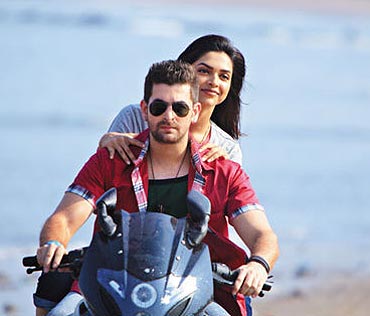
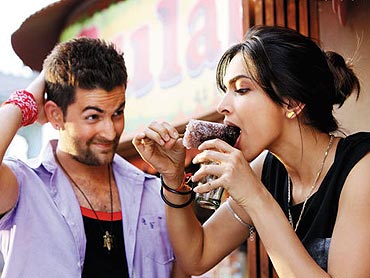
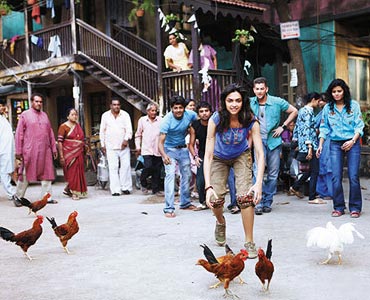
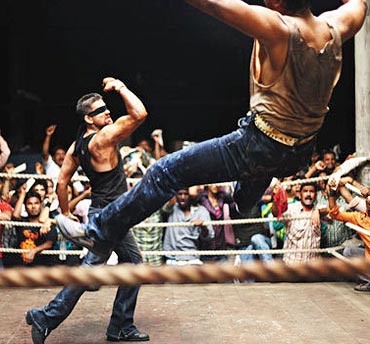
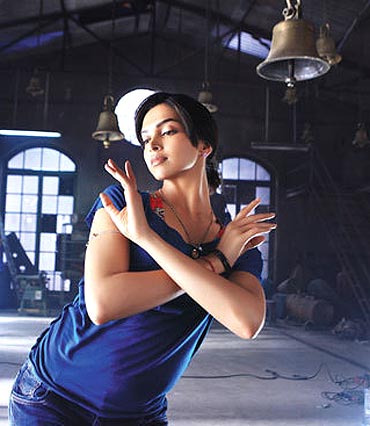
Comment
article